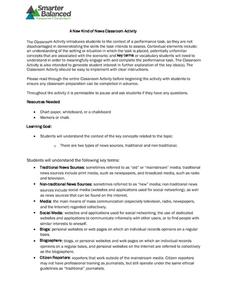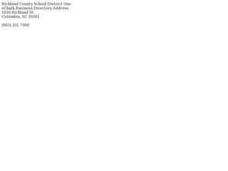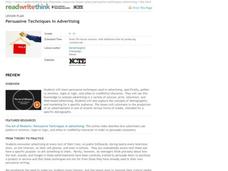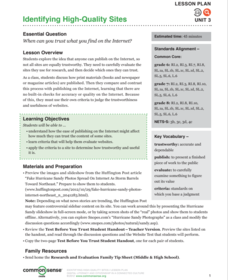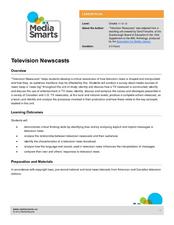Facing History and Ourselves
The Power of Images
One picture but a thousand stories. As a part of a case study of how the death of Michael Brown was reported by professional news sources and on social media class members examine the reactions of various groups to a photograph taken by...
Curated OER
Journalism: Underage Drinking
Young scholars research underage drinking and read a report in the Journal of the American Medical Association about the issue. They interview experts on substance abuse and liquor store owners about their policies. Students publish...
Curated OER
Watching the Clock: An activity to build media-savvy students
Students analyze time constraints on broadcast news. They apply data collecting and data display skills. They identify the difference between news progams and the evening news.
Curated OER
Producing a Daily News Broadcast: A Cross-Curricular Activity
Sixth graders create the daily news for their school.
Facing History and Ourselves
Hands Up, Don't Shoot!
Why is it so difficult to develop a clear understanding of the events surrounding the shooting of Michael Brown by a Ferguson, Missouri, police officer? To answer this question class members listen to a NPR discussion of the findings of...
Smarter Balanced
A New Kind of News
Newspapers and broadcast news. Social media, blogs, and blogospheres. Class members generate a list of news sources they use to get information about events. The big idea here is to introduce the necessary vocabulary and to establish a...
Curated OER
The World in 22 Minutes: Constructing a TV News Lineup
Students examine several newspapers to compare front pages, headlines, and photographs, experience role of news editor, define and discuss factors that go into news judgements, and arrange twenty-two minute news broadcast by selecting...
Curated OER
The Electric Experience
Students investigate the effects of television and radio on culture. In this journalism lesson, students consider how electronic media has shaped journalism as they create timelines that feature the changes and compare and contrast print...
Curated OER
Power and Impact of Radio as a Broadcast Medium
Students compare radio coverage of news events with coverage of 21st century new stories. They analyze various forms of media as they relate to news coverage. They write an essay comparing the impact of radio versus that of television
Curated OER
Media Arts: Creating Great Audio for Video
Students learn the basic concepts necessary to produce broadcast quality audio recordings of human speech, which can then be used in professional radio or television productions.
Curated OER
Electronic Media
Students compare forms of electronic media. They watch a news broadcast and take notes on the content being conveyed. After viewing the broadcast, they read newspaper articles or news magazines to locate articles with similar content to...
Curated OER
Newscast From An Ancient City
Seventh graders produce a newscast from an Ancient Roman city. For this journalism and history lesson, 7th graders work in groups to dramatize a historical event from the Roman Empire. students sequence the events, role-play, and create...
News Literacy Project
Fact-Check It!
Here's a lesson designed to help learners develop their digital verification skills. First, expert groups study specific digital verification skills, and in a jigsaw activity, share what they have learned with classmates. The jigsaw...
ReadWriteThink
Persuasive Techniques in Advertising
Help your 21st century learners develop their media smarts with this resource that has them examine the persuasive techniques advertisers use to influence specific demographics and then to use these techniques to craft their own ads.
PBS
What Makes A Good Video Report?
As part of a media literacy unit, class members establish criteria for good video reporting, and practice giving both positive (warm) and constructive (cool) criticism.
Common Sense Media
Identifying High-Quality Sites
Use a Huffington Post article focused on false pictures of Hurricane Sandy to launch a discussion about the reliability of online information. Groups compare and contrast how print and broadcast media regulate data gathering with the...
Curated OER
Media Literacy Skills
Third graders watch a news story from three different networks in order to determine how the same story can be presented in three different ways. Next, working in small groups they create a newscast of a current event to share with the...
Curated OER
Shaping the News
Students explore television journalism. In this journalism activity, students discuss the attributes of television broadcasting. Students then review their journalism code of ethics and then conduct research for stories that have a moral...
Media Smarts
Bias
See how bias operates firsthand. Half of the class reads one article while the other half reads another article on the same event. The obvious differences emerge when the two sides talk about their observations though. Several handouts...
Curated OER
Television Newscasts
When we watch news broadcasts on television, we receive a much more visual perspective than when we read the newspaper. How do sets, clothing, and music contribute to our understanding of the story? Compare American and Canadian news...
Curated OER
Editorial Writing: What's On Your Mind
Students write an editorial column for a newspaper. For this journalism lesson, students discuss and analyze editorials in print and broadcast media. Students will compare the differences in these two formats of editorial pieces and then...
Curated OER
This Just in! Nile Network News Update
Have your young reporters research contributions of the ancient Egyptians, draft scripts, and broadcast their stories live on the Nile Network News. Depending on class size and age, topics may be brainstormed or assigned. The detailed...
Newseum
Civil Rights News Coverage: Looking Back at Bias
Not all southern newspapers covered the civil rights movement of the 1950s and 1960s. Young journalists investigate how The Lexington (Ky. Herald-Leader and The Jackson (Tenn.) Sun re-examined their coverage of the movement. After...
Franklin D. Roosevelt Presidential Library & Museum
Pearl Harbor Activity #1: Newspaper or Radio Account
After listening to President Franklin D. Roosevelt's "Day of Infamy" speech, young historians research information about the Japanese attack on Pearl Harbor, possible motives for the attack, and the consequences of the attack. Scholars...







